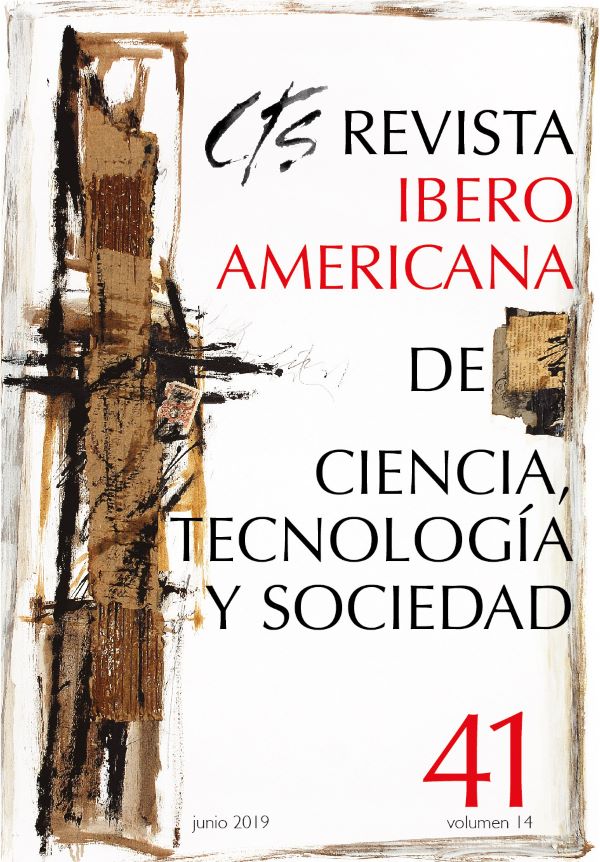From the Public Agora to Social Networks: Towards a Science and a Democracy without Exclusion
Keywords:
social appropriation of science, democratization, citizen participation, social welfare, social progressAbstract
Ibero-America faces new social challenges that must be addressed from a humanistic perspective. On one hand, we see numerous movements that demand greater democratization within their societies, as well as encourage greater participation to cope with the enormous inequalities existing in our territories. With the appearance of new information and communication technologies, the management mechanisms of public affairs have been modified. On the other hand, we must rethink the role of science and technology in the societies of the 21st century, especially in the daily lives of its citizens. This paper analyzes the importance of wellbeing when it comes to exercising an active participation in our Ibero-American countries, and especially in public matters related to scientific or technological issues.Downloads
References
ANGUITA, J. (2014): ¡Rebelión!, Murcia, Alfaqueque Ediciones.
ARISTÓTELES (2015): Política, Madrid, Alianza Editorial.
BARRIO, C. (2008): "La apropiación social de la ciencia: nuevas formas", Revista Iberoamericana de Ciencia, Tecnología y Sociedad —CTS, vol. 4, nº 10, pp. 213-225.
BARRIO, C. y CÁCERES, S. (2014): Fronteras de la ciencia dilemas, Madrid.
BAUMAN, Z. (2017): Vida líquida, Barcelona, Austral.
BONOMETTI, P. (2012): Democracia y desigualdad en América Latina: las implicaciones de un desarrollo basado en la equidad, Saarbrücken, Editorial Académica Española.
BUENO, G. (2012): Qué es la democracia. Disponible en: www.fgbueno.es/med/tes/t001.htm. Consultado 12 de septiembre de 2018.
CHOMSKY, N. (2016): El beneficio es lo que cuenta: neoliberalismo y orden global, Barcelona, Austral.
FUENTE-COBO, C. (2017): “Públicos vulnerables y empoderamiento digital: el reto de una sociedad e-inclusiva”, El profesional de la información, vol. 26, nº 1, pp. 5-12.
GÓMEZ, F. J. (2014): “Desprofesionalización y exigencias éticas de los trabajadores de la ciencia”, en C. Barrio y S. Cáceres (eds.): Fronteras de la ciencia. Dilema, Madrid, Biblioteca Nueva, pp. 89-103.
GRAMSCI, A. (1967): La formación de los intelectuales, Editori Riuniti, México.
HERNÁNDEZ, M. (2008): Exclusión social y desigualdad, Murcia.
LÓPEZ PAREJA, E. (2014): “La comunicación del riesgo en las organizaciones públicas y privadas”, en C. Barrio y S. Cáceres (eds.): Fronteras de la ciencia. Dilema, Madrid, Biblioteca Nueva, pp. 89-103.
LÓPEZ-CEREZO, J. A. (2017): Comprender y comunicar la ciencia, Madrid, Catarata.
MACIONIS, J. y PLUMMER, K. (2011): Sociología. Disponible en: https://bit.ly/2fRfc2S. Consultado el 1 de marzo de 2018.
MILLER, J. (2014): “The importance of Civic Scientific Literacy in a Just-in-time World”, en B. Laspra y E. Muñoz (eds.): Culturas científicas e innovadoras: progreso social, Buenos Aires, EUDEBA.
MUJICA, J. (2014): José Mujica en sus propias palabras, Quito, Colección Palabras del Sur, Unasur.
NACIONES UNIDAS (1948): La Declaración Universal de Derechos Humanos. Disponible en: https://bit.ly/23c5los. Consultado el 20 de marzo de 2018.
NACIONES UNIDAS (1976): Pacto Internacional de Derechos Civiles y Políticos. Disponible en: https://bit.ly/1VtbiXi. Consultado el 1 de abril de 2018.
NACIONES UNIDAS (1976): Pacto Internacional de Derechos Económicos, Sociales y Culturales. Disponible en: https://bit.ly/1DuBaZA. Consultado el 1 de abril de 2018.
OMS (2013): Salud mental: un estado de bienestar. Disponible en: https://bit.ly/1hqychI. Consultado el 15 de marzo de 2018.
PROGRAMA DE LAS NACIONES UNIDAS PARA EL DESARROLLO (2016): Informe sobre Desarrollo Humano 2016, Desarrollo humano para todas las personas, Washington, Communications Development Incorporated.
QUINTANILLA, M. A. (2010): La ciencia y la cultura científica. Disponible en: https://bit.ly/2uUaCZS. Consultado el 15 de marzo de 2018.
SOCIAL PROGRESS INDEX (2018): Social Progress Index 2018, Executive Summary. Disponible en: www.socialprogress.org. Consultado el 26 de septiembre de 2018.
SUBIRATS, J. (2004): Pobreza y exclusión social. Un análisis de la realidad española y europea. Disponible en: https://bit.ly/1MgakdD. Consultado el 9 de abril de 2018.
UNESCO (1999): Declaración de Santo Domingo, La ciencia para el siglo XXI: una nueva visión y un marco de acción. Disponible en: https://bit.ly/2IFUVHJ. Consultado el 1 de marzo de 2018.
WALLER, F. (2014): “How to protect nature against science?”, en C. Barrio y S. Cáceres (eds.): Fronteras de la ciencia. Dilemas, Madrid, Biblioteca Nueva, pp. 23-31.
Downloads
Published
How to Cite
Issue
Section
License
All CTS's issues and academic articles are under a CC-BY license.
Since 2007, CTS has provided open and free access to all its contents, including the complete archive of its quarterly edition and the different products presented in its electronic platform. This decision is based on the belief that offering free access to published materials helps to build a greater and better exchange of knowledge.
In turn, for the quarterly edition, CTS allows institutional and thematic repositories, as well as personal web pages, to self-archive articles in their post-print or editorial version, immediately after the publication of the final version of each issue and under the condition that a link to the original source will be incorporated into the self-archive.











